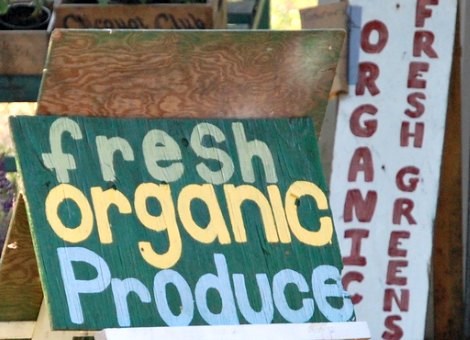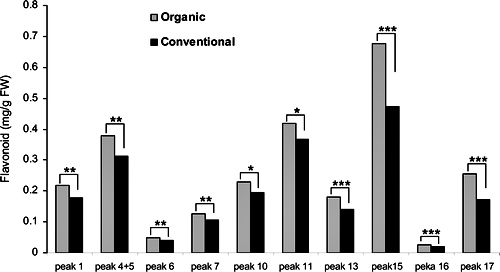Organic Food Debate
September 7, 2012 Written by JP [Font too small?]On a daily basis, headlines appear on your computer screen, radio and television that may lead you to question almost everything you think you know about how to stay well. The latest and most provocative example is a news item that puts into question the value of consuming organic foods. Conventional media outlets, including Reuters, have posted pieces with definitive sounding titles such as, “Organic Food No More Nutritious Than Non-Organic”. However, a closer look at the source data and current studies appearing in the scientific literature suggest that there’s more to the story than just this sort of headline.
Let’s start by examining the information presented in the original article appearing in the current issue of the Annals of Internal Medicine. In it, an evaluation of 240 studies (17 human studies and 223 studies testing contaminant and nutrient levels) were analyzed by a few independent investigators. Two of the human trials determined that organic diets resulted in “lower urinary pesticide levels among children consuming organic versus conventional diets”. Not surprisingly, the likelihood of finding detectable pesticide residues in conventional produce was significantly greater – 30% in conventional and 7% in organic samples. What’s more, according to Reuters, “Organic pork and chicken were 33 percent less likely to carry bacteria resistant to three or more antibiotics than conventionally produced meat”. The conclusion of the review states that, “Consumption of organic foods may reduce exposure to pesticide residues and antibiotic-resistant bacteria”.
From a health standpoint, the single most important message I want to convey is that there’s much more to food than just nutrient content. Within every whole food there are naturally occurring chemicals (known as phytochemicals), which are non-nutritive but, nonetheless, benefit various aspects of well being. Many studies, including several from 2011 and 2012, demonstrate that organically grown produce is generally higher in health promoting substances including carotenoids, omega-3 fatty acids and phenolic compounds than conventionally grown and raised foods. Of late, some of the common foods that have shown organic superiority include: bell peppers, blueberries, broccoli, dairy products, spinach and tomatoes. In some instances, greater concentrations of select nutrients, such as Vitamin C have also been established.
Apart from the phytochemical issue, any balanced review of organic versus conventional foods needs to acknowledge several key points: 1) Organic foods are almost always more expensive; 2) Not all conventionally grown fruits and vegetables contain meaningful levels of pesticides; 3) Organic farming tends to be more challenging for farmers, but likely better for the environment via the promotion of healthier ecosystems. Points 1 and 2 can largely be addressed by reviewing the Environmental Working Group’s Shopping Guide to Pesticides in Produce. The list is a helpful resource for anyone on a budget who is interested in avoiding diet related chemical exposure. The issue of environmental impact is outside of the realm of this particular blog. Nevertheless, since we’re all sharing the same planet, it’s a topic that I believe is worthy of consideration.
Note: Please check out the “Comments & Updates” section of this blog – at the bottom of the page. You can find the latest research about this topic there!
To learn more about the studies referenced in today’s column, please click on the following links:
Study 1 – Reuters: Organic Food No More Nutritious Than Non-Organic … (link)
Study 2 – Are Organic Foods Safer or Healthier Than Conventional Alternatives? … (link)
Study 3 – Quality Parameters and Antioxidant Properties in Organic and … (link)
Study 4 – Evaluation of a Method To Characterize the Phenolic Profile of Organic … (link)
Study 5 – Effects of Organic Farming and Genotype on Alimentary and … (link)
Study 6 – Comparison of Nutritional Quality Between Conventional and Organic … (link)
Study 7 – Effect of Organic and Conventional Cropping Systems on Ascorbic Acid … (link)
Study 8 – Characterisation of Antioxidant Compounds in Sweet Bell Pepper … (link)
Study 9 – Procyanidin, Anthocyanin, and Chlorogenic Acid Contents of Highbush … (link)
Study 10 – Organic Farming Improves Pollination Success in Strawberries … (link)
Organic Spinach Contains More Flavonoids (Antioxidants)
Source: PLoS One. 2012;7(2):e31599. (link)
Tags: Antibiotics, Antioxidants, Organic
Posted in Food and Drink, General Health, Nutrition



September 7th, 2012 at 12:21 pm
Hi JP,
Very timely update! Thank you!
Paul
September 7th, 2012 at 1:25 pm
Thank you, Paul!
Be well!
JP
July 10th, 2015 at 9:29 am
Update 07/10/15:
http://ehp.niehs.nih.gov/wp-content/uploads/advpub/2015/7/ehp.1409518.acco.pdf
Environ Health Perspect – Advance Publication: 9 July 2015
Organic Food Consumption during Pregnancy and Hypospadias and Cryptorchidism at Birth: The Norwegian Mother and Child Cohort Study (MoBa)
Background: The etiologies of the male urogenital anomalies hypospadias and cryptorchidism remain unclear. It has been suggested that maternal diet and environmental contaminants may affect the risk of these anomalies via placental or hormonal disturbances.
Objectives: To examine associations between organic food consumption during pregnancy and prevalence of hypospadias and cryptorchidism at birth.
Methods: Our study includes 35,107 women participating in the Norwegian Mother and Child Cohort Study (MoBa) who delivered a singleton male infant. Information about use of six groups of organically produced food (vegetables, fruit, bread/cereal, milk/dairy products, eggs and meat) during pregnancy was collected by a food frequency questionnaire. Women who indicated that they sometimes, often, or mostly consumed organic foods in at least one of the six food groups were classified as organic food consumers in analyses. Hypospadias and cryptorchidism diagnoses were retrieved from the Medical Birth Registry of Norway. We estimated odds ratios (ORs) and 95 percent confidence intervals (95% CIs) using multiple logistic regression.
Results: Seventy-four male newborns were diagnosed with hypospadias (0.2%) and 151 with cryptorchidism (0.4%). Women who consumed any organic food during pregnancy were less likely to give birth to a boy with hypospadias (OR=0.42; 95% CI: 0.25, 0.70 based on 21 exposed cases) than women who reported they never or seldom consumed organic food. Associations with specific organic foods were strongest for vegetable (OR=0.36; 95% CI: 0.15, 0.85; 10 exposed cases) and milk/dairy (OR=0.43; 95% CI: 0.17, 1.07; 7 exposed cases) consumption. No substantial association was observed for consumption of organic food and cryptorchidism.
Conclusions: Consumption of organically produced foods during pregnancy was associated with a lower prevalence of hypospadias in our study population. These findings were based on small numbers of cases and require replication in other study populations.
Be well!
JP
November 20th, 2016 at 7:36 pm
Updated 11/20/16:
https://www.ncbi.nlm.nih.gov/pubmed/27859352
J Sci Food Agric. 2016 Nov 12.
Evaluation of polyphenolic content and antioxidant activity in two onion varieties grown under organic and conventional production systems.
BACKGROUND: Onions contain a number of bioactive compounds – in particular polyphenols. They are a rich source of such compounds in the human diet and offer significant health benefits to the consumer. Demand for organic crops is steadily increasing partly based on the expected health benefits of organic food consumption. The current study examines the influence of organic and conventional crop management practices on bioactive polyphenolic content of onion.
RESULTS: We examined the effect of conventional, organic, and mixed cultivation practices on the content of total phenolics, total flavonoids and antioxidant activity in two varieties of onion grown over four years in a split-plot factorial systems comparison trial. Levels of total phenolics and total flavonoids showed a significant year on year variation and were significantly different between organic and conventional production systems. The levels of total phenolics, total flavonoids and antioxidant activity in generally were significantly higher (p < 0.05) under fully organic compared to fully conventional management. CONCLUSION: Organic cultivation practices resulted in significantly higher levels of potential bioactive compounds in onion. Be well! JP